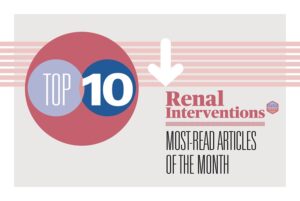 The 19th annual scientific meeting of the American Society of Diagnostic and Interventional Nephrology (ASDIN; 17–19 February, Orlando, USA) loomed large in February, with deep dives into drug-coated balloons and distal radial artery cannulation among the highlights. Elsewhere, interviews with Robert Jones (Birmingham, UK) and Felix Mahfoud (Homburg, Germany) offered insights on interventional radiology, renal denervation and more.
The 19th annual scientific meeting of the American Society of Diagnostic and Interventional Nephrology (ASDIN; 17–19 February, Orlando, USA) loomed large in February, with deep dives into drug-coated balloons and distal radial artery cannulation among the highlights. Elsewhere, interviews with Robert Jones (Birmingham, UK) and Felix Mahfoud (Homburg, Germany) offered insights on interventional radiology, renal denervation and more.
Looking to the Pan Arab Interventional Radiological Society meeting (PAIRS, 11–14 February, Dubai, UAE), Karim Abdel Tawab (Ain Shams University, Cairo, Egypt) speaks at the 2022 Endo Vascular Access Meeting (EVA, 4–8 July 2022, Patras, Greece) to PAIRS president Ayman Al-Sibaie (Sharjah Medical Center, Sharjah, UAE). They explore some of the aspects of dialysis access that will be covered at the Dubai-based conference.
The second day of ASDIN’s 2023 meeting started with style, as Tze-Woei Tan (Keck School of Medicine of the University of Southern California, Los Angeles, USA) opened a session on controversies in access care with a comparison of the upper extremity Haemodialysis Reliable Outflow (HeRO) graft and lower extremity grafts.
“More than in any other medical discipline,” says Vascular Access Society of Britain and Ireland (VASBI) president Robert Jones, “interventional radiology (IR) is where medicine meets technology”. A consultant interventional radiologist at Queen Elizabeth Hospital Birmingham, he is now looking to expand the society’s reach to patients, and help it stoke more interest in arteriovenous (AV) access from interventional radiologists. Speaking to Renal Interventions on IR its future, he describes its unique challenges, his mentors and the music that makes it onto his playlist.
ASDIN’s 2023 meeting also played host to a packed session on new technologies for interventional nephrology. Amidst this came a presentation from Daniel Patel (Volusia Flagler Vascular Center, Daytona Beach, USA) on drug-coated balloon (DCB) use in arteriovenous fistula (AVF) stenosis.
The publication of a consensus statement from the European Society of Cardiology (ESC) Council on Hypertension and the European Association of Percutaneous Cardiovascular Interventions (EAPCI) is among the final steps in the evaluation of renal denervation as a device-based treatment for hypertension. This is according to Felix Mahfoud (Saarland University Hospital, Homburg, Germany), a member of the expert committee behind the paper, and one of the foremost investigators of the technique. He discusses patient selection and future indications for the therapy with Renal Interventions.
Rajeev Narayan presented at ASDIN to give his tips and tricks on distal radial artery cannulation. “There are many things that are exciting in the field of nephrology,” said moderator of the session Anil Agarwal (Veterans Administration Central California Health Care System, Fresno, USA), introducing Narayan and his talk’s topic, “but some of them are downright scary”. Narayan aimed to shed some useful light on the procedure.
A catheter produced by Medtronic and used in haemodialysis has been recalled due to a defect that “may cause serious adverse health outcomes”. An update on the US Food and Drug Administration (FDA) website has laid out the specifics behind the recall as well as the organisation’s advice on how to proceed for those affected.
Chronic kidney disease (CKD) patients who are older or more vulnerable can achieve similar outcomes with their treatment, particularly on understanding of it and their condition, compared to those with less advanced disease through a combined “team-based approach” including “physicians, advanced practitioners, social workers, pharmacists and dieticians”. That is one conclusion of a recently-published study in Kidney Medicine.
A new way to reduce progression of diabetic kidney disease, affecting 40% of people with diabetes, has been discovered by researchers. A University of Bristol-led study, recently published in JCI Insight, could help the 4.8 million people in the UK with diabetes who are four times more likely to need either dialysis or a kidney transplant.
In this Renal Interventions roundtable, Andrew Holden (moderator; Auckland, New Zealand) is joined by Alexandros Mallios (Paris, France), Kate Steiner (Stevenage, UK) and Tobias Steinke (Düsseldorf, Germany) who discuss some of the key findings to come out of the 36-month IN.PACT AV Access trial data.











